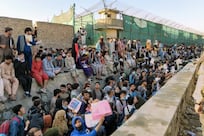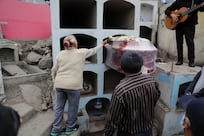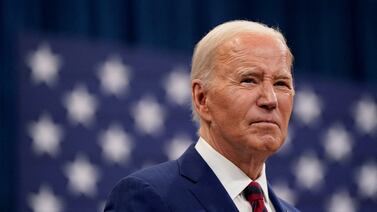When Pfizer, a US drugs maker, manufacturer, and BioNTech, a German biotechnology company, announced the discovery of their joint vaccine, the chief executive of the American pharmaceuticals giant called labelled it the greatest advance in medicine in the past century. His case was strong: the project created an entirely new form of vaccine technology in a matter of months. And yet, after many historic and unprecedented achievements such as these, the threat from Covid-19 continues to restrict our lives, limit economies and overwhelm overrun health systems.
Even in the few countries lucky enough to start thinking about a return to normal, the virus continues to demand innovative responses, and often difficult decisions. This week, Abu Dhabi introduced measures that restrict people's a person's access to particular public spaces, such as malls, hotels and restaurants, based on their testing history and vaccination status. The emirate is also testing trialling scanners that could screen people for Covid-19 infection from a distance.

The UK has recently delayed a reopening date by a month. And in the middle midst of a devastating wave of infections, India has nonetheless reopened the Taj Mahal, in a bid to help the country's struggling tourism industry. The National reported yesterday that Germany is considering an end to the mandatory wearing of face masks indoors after it recorded its lowest infection rate in months.
All of these developments are indicative of the conundrum governments now face. With each bit of worrying or promising data, scientific discovery, or new strategy mooted by experts, formulating a path out of the pandemic arguably becomes more difficult, not less so. As the toolbox expands, so does the complexity of choosing the right ones for the job.
The early days of the pandemic were terrifying, and countries had to react quickly to new challenges, whether it was securing enough PPE to protect medics, creating an effective testing infrastructure to monitor the disease, or discovering and administering vaccines to save lives.
But as the threat of death and serious illness posed by Covid-19 starts to decline in countries with successful inoculation programmes, governments now face the unenviable task of defining what exactly "recovery" looks like, the new measure of progress. Is it about ending social distancing? Is it about re-opening economies or the travel industry? Is it about the suppression of new variants? Or is it about even eradicating the virus altogether?
There have been no easy decisions during the pandemic. Faced with the need to lock down, governments across the globe made took some of the most difficult choices states a state can make. But the urgency of the situation at least revealed clear steps and clear objectives. As countries start to look at mull exactly how to recover, or even what a recovery looks like, it is quite possible that we might be entering the most complex phase of the pandemic yet.













